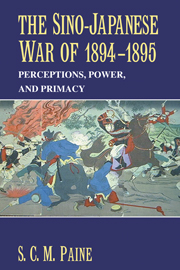Book contents
- Frontmatter
- Contents
- List of Maps
- Acknowledgments
- Part I The Clash of Two Orders: The Far East on the Eve of the War
- 1 The Reversal in the Far Eastern Balance of Power
- 2 The Decline of the Old Order in China and Korea
- 3 The Rise of a New Order in Russia and Japan
- Part II The War: The Dividing Line Between Two Eras
- Part III The Settlement: The Modern Era in Far Eastern Diplomacy
- Epilogue: Perceptions, Power, and War
- Bibliographic Essay
- Bibliography
- Index
2 - The Decline of the Old Order in China and Korea
Published online by Cambridge University Press: 16 January 2010
- Frontmatter
- Contents
- List of Maps
- Acknowledgments
- Part I The Clash of Two Orders: The Far East on the Eve of the War
- 1 The Reversal in the Far Eastern Balance of Power
- 2 The Decline of the Old Order in China and Korea
- 3 The Rise of a New Order in Russia and Japan
- Part II The War: The Dividing Line Between Two Eras
- Part III The Settlement: The Modern Era in Far Eastern Diplomacy
- Epilogue: Perceptions, Power, and War
- Bibliographic Essay
- Bibliography
- Index
Summary
Korean rulers, under whatever impulse they act, seem determined to create causes of international friction; petty causes, it is true, but these littles may make a mickle one fine day.
The Japan Weekly Mail, February 17, 1894Korea seems a very poor place to fight for. Its people are plunged in the most miserable poverty of any in the poverty-stricken East …. Japan, in spite of all her mistakes, stands for light and civilization; her institutions are enlightened; her laws, drawn up by European justice, are equal to the best we know, and they are justly administered; her punishments are humane; her scientific and sociological ideals are our own. China stands for darkness and savagery. Her science is ludicrous superstition, her law is barbarous, her punishments are awful, her politics are corruption, her ideals are isolation and stagnation.
Sir Henry Norman, British journalist, 1894In 1894, the great Pullman Railway Strike paralyzed the economy of the Western half of the United States; the muckraking journalist Henry Demarest Lloyd published his expose of John D. Rockefeller's Standard Oil Company; and the United States remained in the throes of the Depression of 1893. In France, 1894 marked the beginning of the long, drawn-out Dreyfus affair, when anti-Semitism led to the court-martial and imprisonment on Devil's Island of an innocent Jewish officer. There were headlines concerning the assassinations of President Carnot of France and the Bulgarian nationalist, Stefan Stambulov. Tsar Alexander HI of Russia unexpectedly died, leaving the throne to his unprepared and panic-stricken twenty-six-year-old son, Nicholas II.
- Type
- Chapter
- Information
- The Sino-Japanese War of 1894–1895Perceptions, Power, and Primacy, pp. 21 - 61Publisher: Cambridge University PressPrint publication year: 2002



